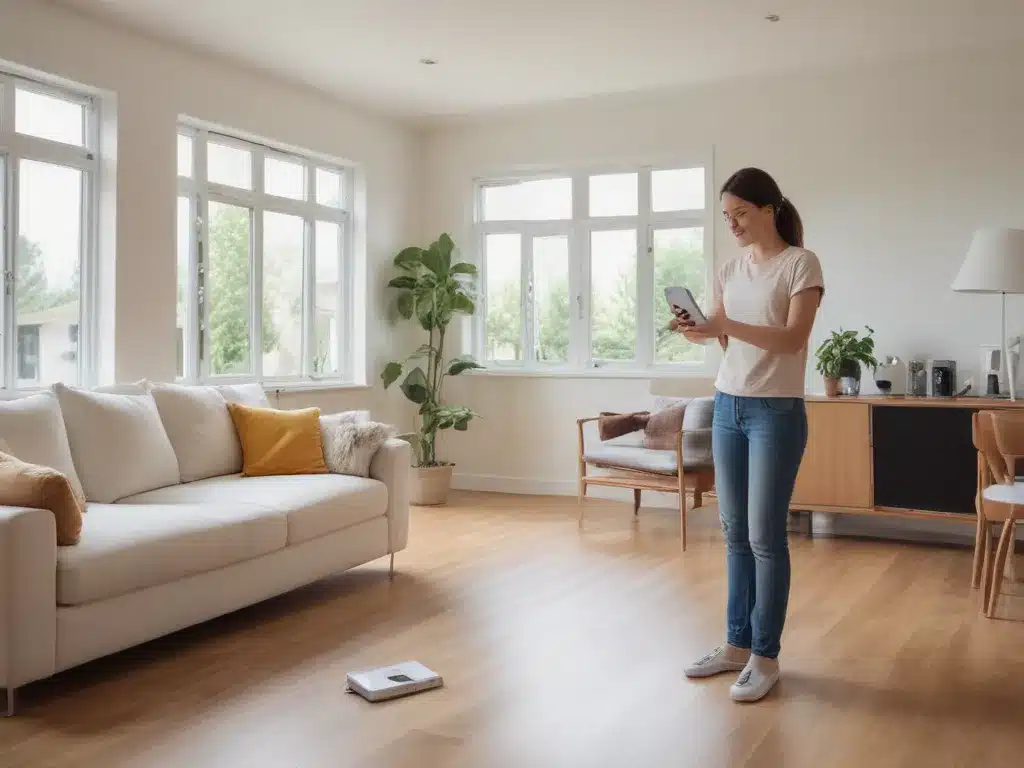The Rise of Smart Home Technology
The advent of smart home technology has significantly transformed the way we approach home management and maintenance. As an avid technology enthusiast, I have closely followed the evolution of these intelligent systems and their potential to revolutionize our daily routines, including the way we maintain a clean and organized living environment. The integration of various sensors, automation, and AI-driven control systems has the power to streamline our cleaning tasks, optimize resource utilization, and even predict potential issues before they arise.
One of the key benefits of smart home technology, in my opinion, is its ability to enhance the efficiency of our cleaning efforts. Smart home devices can monitor the cleanliness of different areas in our homes, providing real-time insights and recommendations on when and where to focus our cleaning efforts. Robotic vacuums, for example, can navigate through our homes autonomously, ensuring that floors are consistently maintained, even in hard-to-reach corners. Smart air purifiers can automatically adjust their settings based on air quality, while intelligent lighting systems can optimize illumination to enhance visibility and energy efficiency during cleaning tasks.
Moreover, smart home technology can help us better manage our household resources, contributing to a more sustainable and eco-friendly approach to cleaning. Smart water sensors, for instance, can detect leaks and monitor water usage, allowing us to identify and address any wasteful practices. Intelligent laundry systems can optimize detergent and water consumption based on load size and soil levels, reducing the overall environmental impact of our cleaning routines.
Predictive Maintenance and Automation
One of the most compelling aspects of smart home technology, in my experience, is its ability to anticipate and address potential problems before they escalate. Sensors and AI-powered algorithms can detect early signs of wear and tear, such as clogged filters or malfunctioning appliances, and proactively notify us or even initiate self-repair procedures. This predictive maintenance approach can help us maintain a clean and well-functioning home, reducing the frequency and severity of issues that might otherwise disrupt our daily lives.
Furthermore, automation is a key feature of smart home technology that can significantly simplify our cleaning routines. Scheduled cleaning cycles, automated water shutoff, and self-cleaning functions for various household appliances can reduce the manual effort required and ensure that our homes are consistently maintained to our desired standards. As a busy individual, I find these automated features particularly valuable, as they free up my time and allow me to focus on other important tasks or leisure activities.
Integrating Smart Home Devices into Cleaning Routines
Incorporating smart home technology into our cleaning routines, however, requires a thoughtful and strategic approach. Compatibility and integration between various smart devices and systems are crucial to ensuring a seamless and efficient user experience. As I’ve learned, taking the time to research and carefully select compatible smart home products can make a significant difference in the effectiveness of our cleaning efforts.
Moreover, customization and personalization play a vital role in maximizing the benefits of smart home technology for cleaning. Personalizing automation schedules, adjusting sensor thresholds, and integrating smart home devices with our preferred cleaning tools and products can help us create a tailored system that addresses our unique needs and preferences.
Addressing Potential Challenges
Despite the numerous advantages of smart home technology for cleaning, there are also some potential challenges that I’ve encountered. Data privacy and security are essential considerations, as smart home devices collect and process a significant amount of personal and household data. Ensuring that our smart home systems are equipped with robust security measures and that we understand and consent to the data usage policies is crucial to maintaining control over our private information.
Another challenge is the initial cost and complexity of smart home implementation. Upgrading an entire home with smart devices can be a significant financial investment, and the learning curve associated with setting up and managing these systems may deter some homeowners. However, as the technology continues to evolve and become more mainstream, I expect that the costs will decrease, and the user experience will become more intuitive and accessible.
The Future of Smart Homes and Cleaning
As I look ahead, I am excited about the continued advancements in smart home technology and its potential to revolutionize the way we maintain clean and organized living spaces. Innovations in areas such as robotics, computer vision, and edge computing are likely to further enhance the capabilities of smart home devices, making them even more efficient, adaptable, and integrated into our daily routines.
Moreover, I anticipate that the integration of smart home technology with professional cleaning services will become more prevalent in the future. Companies like AdamCleaning.uk may leverage these intelligent systems to optimize their cleaning schedules, streamline their operations, and provide even more personalized and efficient services to their clients.
In conclusion, the rise of smart home technology has indeed opened up new possibilities for maintaining a clean and well-organized home. By embracing these intelligent systems and integrating them into our cleaning routines, we can enjoy greater efficiency, sustainability, and predictive maintenance, ultimately leading to a more harmonious and stress-free living environment. As an early adopter of smart home technology, I am excited to see how these innovations will continue to shape the future of home cleaning and management.







